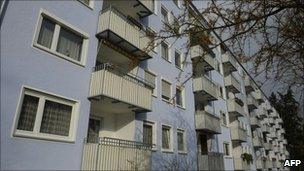Netherlands calls for arrest of Nazi war criminal Faber
- Published

Faber now lives in the Bavarian town of Ingolstadt in southern Germany
The Netherlands has issued a European arrest warrant for a Dutch-born Nazi war criminal, Klaas-Carel Faber, now living in Germany.
Faber, 88, was sentenced to death in 1947 for the deaths of Jews at the Westerbork transit camp but his term was commuted to life.
He escaped in 1952, was given German citizenship and now lives in Bavaria.
Local media say it is the first time the Netherlands has issued a European arrest warrant for a war criminal.
In a statement, the Netherlands public prosecutor's office described the warrant as a preliminary step before a formal extradition request is made to Germany.
"We are hopeful and we think that it is important, so that he can at last go to jail. We don't know if we'll be successful," spokeswoman Tineke Zwart told the BBC News website.
Reprisals
Faber, originally from the western Dutch town of Haarlem, served in an SS unit known as Kommando Feldmeijer during World War II.
The group was renowned for killing around 50 Dutch civilians considered "anti-German" as reprisals for attacks by the resistance.
Earlier this year, a member of the same SS unit, Heinrich Boere, was sentenced to life by a court in the German city of Aachen for the murder of three Dutch civilians in 1944.
Boere, Faber and Faber's brother, Pieter, had all been involved in the Silbertanne (Silver Pine) operation.
Pieter Faber was executed for war crimes in 1948.
Extradition
Klaas-Carel Faber is high on the Simon Wiesenthal Centre's list of Nazi war criminals still at large.
For years, Germany has refused his extradition on the grounds that he is a German citizen.
After it emerged earlier this year that he was living in the Bavarian town of Ingolstadt, Germany said it would re-assess his case.
The Dutch and German justice ministers are said to have discussed Faber's extradition, although a final decision will be taken by a German judge.
If Faber is returned to the Netherlands, he will be sent straight to prison because of his conviction for murder.
- Published22 November 2010
- Published6 November 2010